- Home
- Anne Lamott
Bird by Bird: Some Instructions on Writing and Life Page 16
Bird by Bird: Some Instructions on Writing and Life Read online
Page 16
Sam saw his first dead person last month. Two friends of ours had a baby who died, and we went to spend the morning with them and the body of their son. He was five months old and weighed eight pounds, down from the ten he weighed at birth. He wore a white baptismal gown, and lay in a big basket on top of his crib, covered with flower petals from the waist down, white as a rose. There were flowers and shrines everywhere, statues of the Buddha and pictures of his Holiness the Dalai Lama (because his mother is a Buddhist) and of Jesus (because his father is a Christian). Brice looked like a small, concerned angel from someplace snowy. None of us, including Sam, could take our eyes off him. He looked like God.
"You what?" my relatives asked when I mentioned this. "You took Sam to see what?" as in, What will you take him to see next? Brain surgery? I couldn’t explain why I thought it was right, except that I was taught to be terrified of sickness and death (especially early death and also, ironically, aging) and I believe this greatly compromised my life. Of course I want better for Sam.
Lots of my friends have died of cancer and AIDS. But Brice was the first dead person Sam ever saw. Sam didn’t seem scared. Maybe it was because Brice looked so beautiful in death. He was an old pro at it: he had died during delivery and was resuscitated seven minutes later, and so was born a second time, but it turned out that he had been gone too long. His eyes were deep gray, and always open, and he never cried or, for that matter, smiled, or even blinked.
Brice’s mother’s Buddhist friends called him Cloud Boy because he was suspended between heaven and earth, not quite here, not quite there. His father’s Christian friends did much of the cooking. Everyone held him and rocked him. Sam and I spent a lot of time reading to him, mostly Dr. Seuss.
"He’s a good baby, " Sam assured Brice’s parents one day. Not knowing how on earth they would take care of him, they had brought Brice home when he was three weeks old, because they didn’t want him to die at the hospital. They just wanted him to be home with them and their friends. It was an amazing thing to be a part of. Some people saw Brice as a tragedy, thought his parents were crazy for not leaving him at the hospital. The rest of us felt incredibly sad but also that maybe we were in the presence of something holy, something that didn’t have to do with personality or character or age.
"He’s a good baby," Sam told me one day in the car, after we’d been reading to Brice for a while. "But he’s a little funky."
When Brice died, his parents called us and asked if Sam and I would come over. They were sad but Okay. Sam brought the baby two presents that morning, which he laid in the basket. One was a ball, in case you get to play catch on the other side. The other was a small time-travel car, from Back to the Future. Brice’s parents and I are still scratching our heads over that one.
After we left that morning, I took Sam to the local bowling lanes. It was another big first for him. It was all so ridiculous and real that it felt sort of sacred. We bowled in the kids’ lane for an hour. "You took him where?" asked my relatives. And I couldn’t really explain why. It had something to do with wanting to shake off the solemnity, with wanting to complete the cycle of life and death. Bowling is life at its most immediate—you fling a ball and the pins fall down, sometimes. And I also wanted to show Sam that the holy goes on, no matter how many balls you fling at it.
I read this to Brice’s parents before I read it on the radio, and then they called everyone they knew and told them when it would be on, and they recorded it. And even though their son will always be alive in their hearts, like Pammy and my dad will be alive in mine—and maybe this is the only way we ever really have anyone—there is still something to be said for painting portraits of the people we have loved, for trying to express those moments that seem so inexpressibly beautiful, the ones that change us and deepen us.
Toni Morrison said, "The function of freedom is to free someone else," and if you are no longer wracked or in bondage to a person or a way of life, tell your story. Risk freeing someone else. Not everyone will be glad that you did. Members of your family and other critics may wish you had kept your secrets. Oh, well, what are you going to do? Get it all down. Let it pour out of you onto the page. Write an incredibly shitty, self-indulgent, whiny, mewling first draft. Then take out as many of the excesses as you can.
One thing I haven’t told you about my famous short story "Arnold" is that besides sending it off every few months to my father’s agent, I also sent it off to an important magazine editor. He sent it back with the following note: "You have made the mistake of thinking that everything that has happened to you is interesting." Now, needless to say, I was mortified. But the note ended up only helping me because it didn’t stop me. Still, I sat down with great trepidation when I began to write the story of my father’s illness, because of the mistake this editor said I had made, which I had made. And I tried very hard not to make it again. So first I wrote down everything that happened to us, and then I took out the parts that felt self-indulgent. I wasn’t writing the book with my thumb stuck out, trying to hitchhike into history: I just wanted to write a book for my father that might also help someone going through a similar situation. Some people may have thought that this book was too personal, too confessional. But what these people think about me is none of my business. I got to write books about my father and my best friend, and they got to read them before they died. Can you imagine? I wrote for an audience of two whom I loved and respected, who loved and respected me. So I wrote for them as carefully and soulfully as I could—which is, needless to say, how I wish I could write all the time.
Finding Your Voice
I heard a tape once in which an actor talked about trying to find God in the modern world and how, left to our own devices, we seek instead all the worldly things—possessions, money, looks, and power—because we think they will bring us fulfillment. But this turns out to be a joke, because they are just props, and when we check out of this life, we have to give them all back to the great propmaster in the sky. "They’re just on loan," he said. "They’re not ours." This tape changed how I felt about my students emulating their favorite writers. It helped me see that it is natural to take on someone else’s style, that it’s a prop that you use for a while until you have to give it back. And it just might take you to the thing that is not on loan, the thing that is real and true: your own voice.
I often ask my students to scribble down in class the reason they want to write, why they are in my class, what is propelling them to do this sometimes-excruciating, sometimes-boring work. And over and over, they say in effect, "I will not be silenced again." They were good children, who often felt invisible and who saw some awful stuff. But at some point they stopped telling what they saw because when they did, they were punished. Now they want to look at their lives—at life— and they don’t want to be sent to their rooms for doing so. But it is very hard to find their own voice and it is tempting to assume someone else’s.
Every time Isabel Allende has a new book out, I’m happy because I will get to read it, and I’m unhappy because half of my students are going to start writing like her. Now, I love Ms. Allende’s work, as I love a number of South and Central American writers. When I read their books, I feel like I’m sitting around a campfire at night where they are spinning their wild stories—these crazy Rube Goldberg clocks, with lots of birds and maidens and gongs and bells and whistles. I understand why this style is so attractive to my students: it’s like primitive art. It’s simple and decorative, with rich colors, satisfying old forms, and a lot of sophistication underneath that you feel but don’t really see. I always feel like I’m watching a wild theater piece with lots of special effects—so many lives falling apart! But, more important, this style offers the nourishment of imagination and wonder. I love to enter into these fantastical worlds where we feel like we’re looking through the wrong end of the binoculars, where everything is tiny and pretty and rich, because real life is so often big and messy and hurtful and drab. But when someone like Allende polishes
and turns and twists her people and their lives and their families and their ghosts into universal curves and shapes, then the writing resonates in such a way that you think, Yes, yes, that’s exactly what life is like.
I love for my students to want to have this effect. But their renditions never ring true, any more than they ring true a few months later when Ann Beattie’s latest book arrives and my students start submitting stories about shiny bowls and windowpanes. We do live our lives on surfaces, and Beattie does surfaces beautifully, burnishing them, bringing out the details. But when my students do Beattie, their stories tend to be lukewarm, and I say to them, Life is lukewarm enough! Give us a little heat! If I’m going to read about a bunch of people who drive Volkswagens and seem to have mostly Volkswagensized problems, and the writer shows them driving around on top of the ice, I want a sense that there’s a lot of very, very cold water down below. I eventually want for someone to crash through. I want people who write to crash or dive below the surface, where life is so cold and confusing and hard to see. I want writers to plunge through the holes—the holes we try to fill up with all the props. In those holes and in the spaces around them exist all sorts of possibility, including the chance to see who we are and to glimpse the mystery.
The great writers keep writing about the cold dark place within, the water under a frozen lake or the secluded, camouflaged hole. The light they shine on this hole, this pit, helps us cut away or step around the brush and brambles; then we can dance around the rim of the abyss, holler into it, measure it, throw rocks in it, and still not fall in. It can no longer swallow us up. And we can get on with things.
A sober friend once said to me, "When I was still drinking, I was a sedated monster. After I got sober, I was just a monster." He told me about his monster. His sounded just like mine without quite so much mascara. When people shine a little light on their monster, we find out how similar most of our monsters are. The secrecy, the obfuscation, the fact that these monsters can only be hinted at, gives us the sense that they must be very bad indeed. But when people let their monsters out for a little onstage interview, it turns out that we’ve all done or thought the same things, that this is our lot, our condition. We don’t end up with a brand on our forehead. Instead, we compare notes.
We write to expose the unexposed. If there is one door in the castle you have been told not to go through, you must. Otherwise, you’ll just be rearranging furniture in rooms you’ve already been in. Most human beings are dedicated to keeping that one door shut. But the writer’s job is to see what’s behind it, to see the bleak unspeakable stuff, and to turn the unspeakable into words—not just into any words but if we can, into rhythm and blues.
You can’t do this without discovering your own true voice, and you can’t find your true voice and peer behind the door and report honestly and clearly to us if your parents are reading over your shoulder. They are probably the ones who told you not to open that door in the first place. You can tell if they’re there because a small voice will say, "Oh, whoops, don’t say that, that’s a secret," or "That’s a bad word," or "Don’t tell anyone you jack off. They’ll all start doing it." So you have to breathe or pray or do therapy to send them away. Write as if your parents are dead. As I’ve said, we will discuss libel later in this book.
"Why, though?" my students ask, staring at me intently. "Why are we supposed to open all these doors? Why are we supposed to tell the truth in our own voice?" And I stare back at them for a moment. I guess because it’s our nature, I say. Also, I think that most of your characters believe, as children believe, that if the truth were known, they would be seen as good people. Truth seems to want expression. Unacknowledged truth saps your energy and keeps you and your characters wired and delusional. But when you open the closet door and let what was inside out, you can get a rush of liberation and even joy. If we can believe in the Gnostic gospel of Thomas, old Uncle Jesus said, "If you bring forth what is inside you, what you bring forth will save you. If you don’t bring forth what is inside you, what you bring forth can destroy you."
And the truth of your experience can only come through in your own voice. If it is wrapped in someone else’s voice, we readers will feel suspicious, as if you are dressed up in someone else’s clothes. You cannot write out of someone else’s big dark place; you can only write out of your own. Sometimes wearing someone else’s style is very comforting, warm and pretty and bright, and it can loosen you up, tune you into the joys of language and rhythm and concern. But what you say will be an abstraction because it will not have sprung from direct experience: when you try to capture the truth of your experience in some other person’s voice or on that person’s terms, you are removing yourself one step further from what you have seen and what you know.
Truth, or reality, or whatever you want to call it is the bedrock of life. A black man at my church who is nearing one hundred thundered last Sunday, "God is your home," and I pass this on mostly because all of the interesting characters I’ve ever worked with—including myself—have had at their center a feeling of otherness, of homesickness. And it’s wonderful to watch someone finally open that forbidden door that has kept him or her away. What gets exposed is not people’s baseness but their humanity. It turns out that the truth, or reality, is our home.
Look at the two extremes. Maybe you find truth in Samuel Beckett—that we’re very much alone and it’s all scary and annoying and it smells like dirty feet and the most you can hope for is that periodically someone will offer a hand or a rag or a tiny word of encouragement just when you’re going under. The redemption in Beckett is so small: in the second act of Waiting for Godot, the barren dying twig of a tree has put out a leaf. Just one leaf. It’s not much; still Beckett didn’t commit suicide. He wrote.
Or maybe truth as you understand it is 180 degrees away— that God is everywhere and we are all where we’re supposed to be and more will be revealed one day. Maybe you feel that Wordsworth was right, maybe Rumi, maybe Stephen Mitchell writing on Job: "The physical body is acknowledged as dust, the personal drama as delusion. It is as if the world we perceive through our senses, that whole gorgeous and terrible pageant, were the breath-thin surface of a bubble, and everything else, inside and outside, is pure radiance. Both suffering and joy come then like a brief reflection, and death like a pin."
But you can’t get to any of these truths by sitting in a field smiling beatifically, avoiding your anger and damage and grief. Your anger and damage and grief are the way to the truth. We don’t have much truth to express unless we have gone into those rooms and closets and woods and abysses that we were told not to go in to. When we have gone in and looked around for a long while, just breathing and finally taking it in—then we will be able to speak in our own voice and to stay in the present moment. And that moment is home.
Giving
Annie Dillard has said that day by day you have to give the work before you all the best stuff you have, not saving up for later projects. If you give freely, there will always be more. This is a radical proposition that runs so contrary to human nature, or at least to my nature, that I personally keep trying to find loopholes in it. But it is only when I go ahead and decide to shoot my literary, creative wad on a daily basis that I get any sense of full presence, of being Zorba the Greek at the keyboard. Otherwise I am a wired little rodent squirreling things away, hoarding and worrying about supply. Arthritis forms in my hands and in the hands my mind is using to shape things, in the hands of that creature in the cellar who wants and needs to use all of his favorite rags in the ragbag he works from.
You are going to have to give and give and give, or there’s no reason for you to be writing. You have to give from the deepest part of yourself, and you are going to have to go on giving, and the giving is going to have to be its own reward. There is no cosmic importance to your getting something published, but there is in learning to be a giver.
Your work as a writer, when you are giving everything you have to your characters and to
your readers, will periodically make you feel like the single parent of a three-year-old, who is, by turns, wonderful, willful, terrible, crazed, and adoring. Toddlers can make you feel as if you have violated some archaic law in their personal Koran and you should die, infidel. Other times they’ll reach out and touch you like adoring grandparents on their deathbeds, trying to memorize your face with their fingers. One night I was lying in bed with Sam when he was about three and a half, and he touched my cheeks tenderly, as if they were sunburned. "I love that little face," he said, and I felt like in a moment he might squeeze my cheeks and exclaim, "Mein shayner punim!" My beautiful face.
And then the next day Sam was treating me like I was the bunny at his own private Playboy Club and he had run out of drinks half an hour before.
But they are always yours, your books as well as your children. You helped bring your work into being, and every day you have to feed it, help it stay well, give it advice and love it when it ignores you.
Your three-year-old and your work in progress teach you to give. They teach you to get out of yourself and become a person for someone else. This is probably the secret to happiness. So that’s one reason to write. Your child and your work hold you hostage, suck you dry, ruin your sleep, mess with your head, treat you like dirt, and then you discover they’ve given you that gold nugget you were looking for all along.
Two things put me in the spirit to give. One is that I have come to think of almost everyone with whom I come into contact as a patient in the emergency room. I see a lot of gaping wounds and dazed expressions. Or, as Marianne Moore put it, "The world’s an orphan’s home." And this feels more true than almost anything else I know. But so many of us can be soothed by writing: think of how many times you have opened a book, read one line, and said, "Yes!" And I want to give people that feeling, too, of connection, communion.

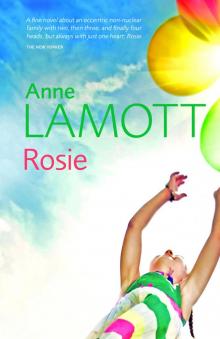 Rosie
Rosie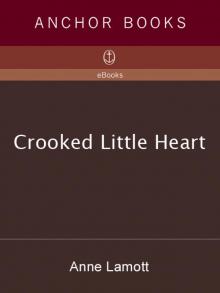 Crooked Little Heart
Crooked Little Heart Bird by Bird: Some Instructions on Writing and Life
Bird by Bird: Some Instructions on Writing and Life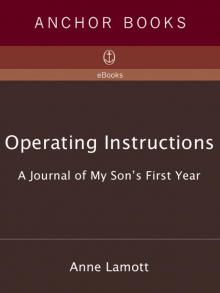 Operating Instructions: A Journal of My Son's First Year
Operating Instructions: A Journal of My Son's First Year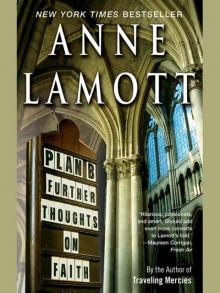 Plan B: Further Thoughts on Faith
Plan B: Further Thoughts on Faith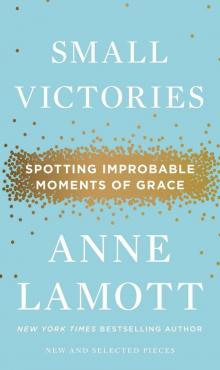 Small Victories: Spotting Improbable Moments of Grace
Small Victories: Spotting Improbable Moments of Grace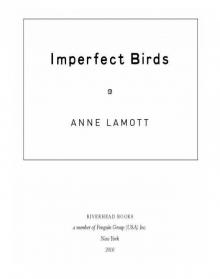 Imperfect Birds
Imperfect Birds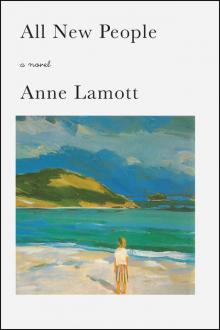 All New People
All New People Grace (Eventually)
Grace (Eventually)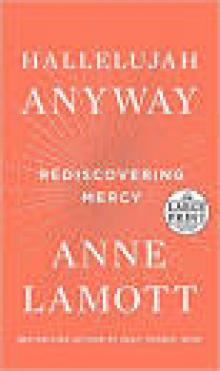 Hallelujah Anyway
Hallelujah Anyway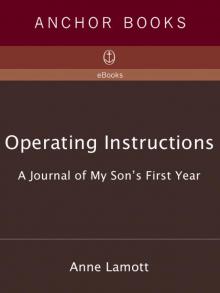 Operating Instructions
Operating Instructions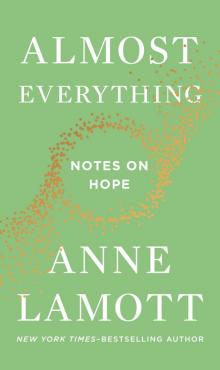 Almost Everything
Almost Everything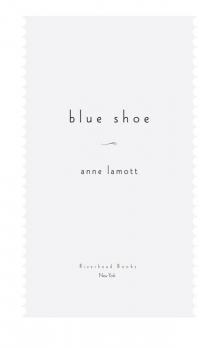 Blue Shoe
Blue Shoe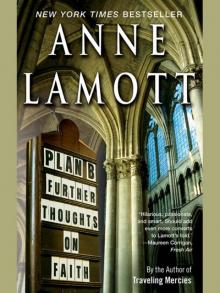 Plan B
Plan B Bird by Bird
Bird by Bird